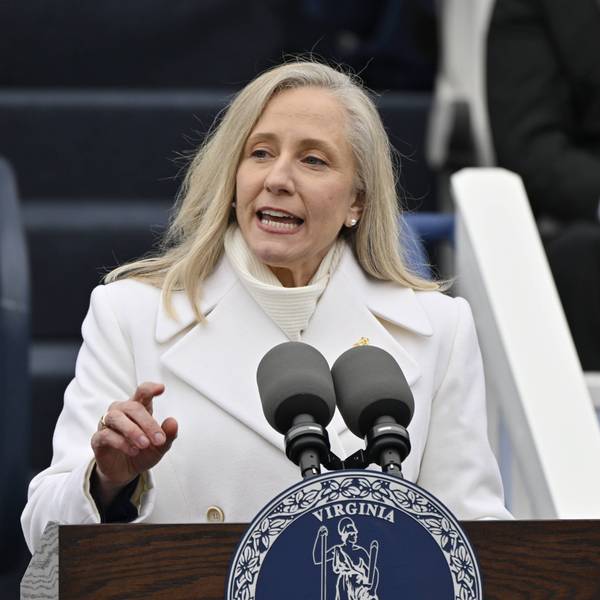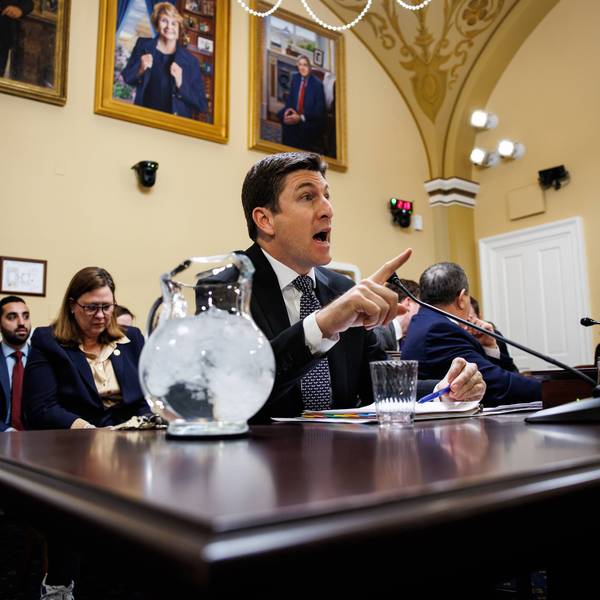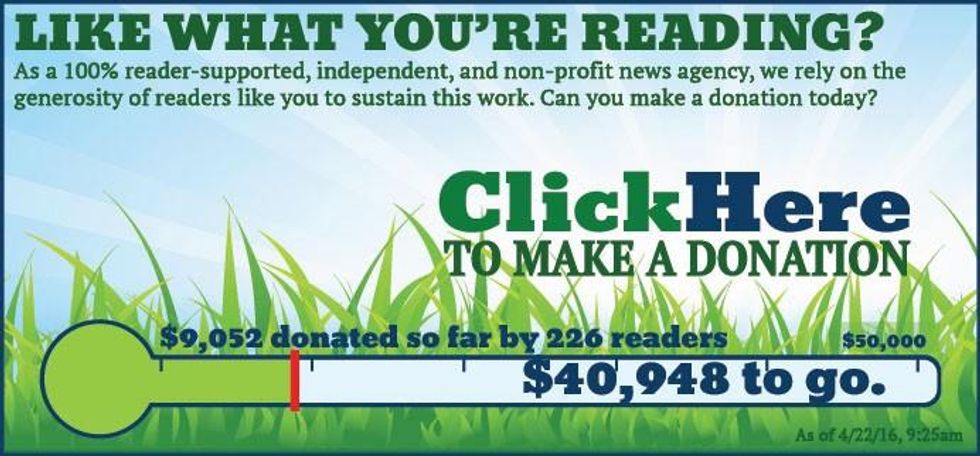'Historic Day for Democracy': Voting Rights Restored for over 200,000 Virginians
'The disenfranchisement of people who have served their sentences was an outdated, discriminatory vestige of our nation's Jim Crow past.'
Civil rights organizations are applauding Gov. Terry McAuliffe's order on Friday restoring voting rights to roughly 200,000 Virginians by eliminating what they call a "vestige of our nation's Jim Crow past."
Using his authority allowed by the state's constitution, the governor's Restoration of Rights order allows convicted felons who've served their time and finished any required supervised release, parole or probation, to be able to vote, as well as be able to run for office, serve on a jury, or be a notary public.
"It is a historic day for democracy in Virginia--and across our nation," said Tram Nguyen, co-executive director of the New Virginia Majority.
The bright spot comes amidst what Brennan Center for Justice's Marissa Marzano called "the biggest voting rights rollback since the Jim Crow era."
The Democratic governor said in a statement, "Too often in both our distant and recent history, politicians have used their authority to restrict peoples' ability to participate in our democracy. Today we are reversing that disturbing trend and restoring the rights of more than 200,000 of our fellow Virginians who work, raise families, and pay taxes in every corner of our Commonwealth."
"I believe it is time to cast off Virginia's troubling history of injustice and embrace an honest, clean process for restoring the rights of these men and women," McAuliffe continued.
Also among those praising the order is the ACLU of Virginia, who said it "matched our hopes and exceeded our expectations."
The group's executive director, Claire Guthrie Gastanaga, pointed to the fact that the restoration applies to both non-violent and violent ex-offenders. In addition, the order "directed the Secretary of the Commonwealth's Office to monitor newly eligible persons and restore their rights on a monthly basis, and restated that eligibility is not contingent upon individuals having paid their fines and court costs" she stated, and praised McAuliffe's description on Friday of those costs as "a vestige of the poll tax."
Ngyuyen added, "The disenfranchisement of people who have served their sentences was an outdated, discriminatory vestige of our nation's Jim Crow past. Virginians rejoining their communities will now regain their voice in our democracy without facing roadblocks to the ballot."
Iowa, Florida, and Kentucky continue--as Virginia had until Friday--to permanently disenfranchise all those with any felony convictions, though as Brennan Center notes, "they are only 3 of the 34 states that bar community members from voting, simply on the basis of convictions in their past."
According to the Sentencing Project, "an estimated 5.85 million Americans are denied the right to vote because of laws that prohibit voting by people with felony convictions. Felony disenfranchisement is an obstacle to participation in democratic life which is exacerbated by racial disparities in the criminal justice system, resulting in 1 of every 13 African Americans unable to vote."
Speaking to these injustices, Advancement Project co-director Judith Browne Dianis said, "We hope the governor's action in Virginia will serve as a new model to advance justice where work remains across this nation."
An Urgent Message From Our Co-Founder
Dear Common Dreams reader, The U.S. is on a fast track to authoritarianism like nothing I've ever seen. Meanwhile, corporate news outlets are utterly capitulating to Trump, twisting their coverage to avoid drawing his ire while lining up to stuff cash in his pockets. That's why I believe that Common Dreams is doing the best and most consequential reporting that we've ever done. Our small but mighty team is a progressive reporting powerhouse, covering the news every day that the corporate media never will. Our mission has always been simple: To inform. To inspire. And to ignite change for the common good. Now here's the key piece that I want all our readers to understand: None of this would be possible without your financial support. That's not just some fundraising cliche. It's the absolute and literal truth. We don't accept corporate advertising and never will. We don't have a paywall because we don't think people should be blocked from critical news based on their ability to pay. Everything we do is funded by the donations of readers like you. Will you donate now to help power the nonprofit, independent reporting of Common Dreams? Thank you for being a vital member of our community. Together, we can keep independent journalism alive when it’s needed most. - Craig Brown, Co-founder |
Civil rights organizations are applauding Gov. Terry McAuliffe's order on Friday restoring voting rights to roughly 200,000 Virginians by eliminating what they call a "vestige of our nation's Jim Crow past."
Using his authority allowed by the state's constitution, the governor's Restoration of Rights order allows convicted felons who've served their time and finished any required supervised release, parole or probation, to be able to vote, as well as be able to run for office, serve on a jury, or be a notary public.
"It is a historic day for democracy in Virginia--and across our nation," said Tram Nguyen, co-executive director of the New Virginia Majority.
The bright spot comes amidst what Brennan Center for Justice's Marissa Marzano called "the biggest voting rights rollback since the Jim Crow era."
The Democratic governor said in a statement, "Too often in both our distant and recent history, politicians have used their authority to restrict peoples' ability to participate in our democracy. Today we are reversing that disturbing trend and restoring the rights of more than 200,000 of our fellow Virginians who work, raise families, and pay taxes in every corner of our Commonwealth."
"I believe it is time to cast off Virginia's troubling history of injustice and embrace an honest, clean process for restoring the rights of these men and women," McAuliffe continued.
Also among those praising the order is the ACLU of Virginia, who said it "matched our hopes and exceeded our expectations."
The group's executive director, Claire Guthrie Gastanaga, pointed to the fact that the restoration applies to both non-violent and violent ex-offenders. In addition, the order "directed the Secretary of the Commonwealth's Office to monitor newly eligible persons and restore their rights on a monthly basis, and restated that eligibility is not contingent upon individuals having paid their fines and court costs" she stated, and praised McAuliffe's description on Friday of those costs as "a vestige of the poll tax."
Ngyuyen added, "The disenfranchisement of people who have served their sentences was an outdated, discriminatory vestige of our nation's Jim Crow past. Virginians rejoining their communities will now regain their voice in our democracy without facing roadblocks to the ballot."
Iowa, Florida, and Kentucky continue--as Virginia had until Friday--to permanently disenfranchise all those with any felony convictions, though as Brennan Center notes, "they are only 3 of the 34 states that bar community members from voting, simply on the basis of convictions in their past."
According to the Sentencing Project, "an estimated 5.85 million Americans are denied the right to vote because of laws that prohibit voting by people with felony convictions. Felony disenfranchisement is an obstacle to participation in democratic life which is exacerbated by racial disparities in the criminal justice system, resulting in 1 of every 13 African Americans unable to vote."
Speaking to these injustices, Advancement Project co-director Judith Browne Dianis said, "We hope the governor's action in Virginia will serve as a new model to advance justice where work remains across this nation."
Civil rights organizations are applauding Gov. Terry McAuliffe's order on Friday restoring voting rights to roughly 200,000 Virginians by eliminating what they call a "vestige of our nation's Jim Crow past."
Using his authority allowed by the state's constitution, the governor's Restoration of Rights order allows convicted felons who've served their time and finished any required supervised release, parole or probation, to be able to vote, as well as be able to run for office, serve on a jury, or be a notary public.
"It is a historic day for democracy in Virginia--and across our nation," said Tram Nguyen, co-executive director of the New Virginia Majority.
The bright spot comes amidst what Brennan Center for Justice's Marissa Marzano called "the biggest voting rights rollback since the Jim Crow era."
The Democratic governor said in a statement, "Too often in both our distant and recent history, politicians have used their authority to restrict peoples' ability to participate in our democracy. Today we are reversing that disturbing trend and restoring the rights of more than 200,000 of our fellow Virginians who work, raise families, and pay taxes in every corner of our Commonwealth."
"I believe it is time to cast off Virginia's troubling history of injustice and embrace an honest, clean process for restoring the rights of these men and women," McAuliffe continued.
Also among those praising the order is the ACLU of Virginia, who said it "matched our hopes and exceeded our expectations."
The group's executive director, Claire Guthrie Gastanaga, pointed to the fact that the restoration applies to both non-violent and violent ex-offenders. In addition, the order "directed the Secretary of the Commonwealth's Office to monitor newly eligible persons and restore their rights on a monthly basis, and restated that eligibility is not contingent upon individuals having paid their fines and court costs" she stated, and praised McAuliffe's description on Friday of those costs as "a vestige of the poll tax."
Ngyuyen added, "The disenfranchisement of people who have served their sentences was an outdated, discriminatory vestige of our nation's Jim Crow past. Virginians rejoining their communities will now regain their voice in our democracy without facing roadblocks to the ballot."
Iowa, Florida, and Kentucky continue--as Virginia had until Friday--to permanently disenfranchise all those with any felony convictions, though as Brennan Center notes, "they are only 3 of the 34 states that bar community members from voting, simply on the basis of convictions in their past."
According to the Sentencing Project, "an estimated 5.85 million Americans are denied the right to vote because of laws that prohibit voting by people with felony convictions. Felony disenfranchisement is an obstacle to participation in democratic life which is exacerbated by racial disparities in the criminal justice system, resulting in 1 of every 13 African Americans unable to vote."
Speaking to these injustices, Advancement Project co-director Judith Browne Dianis said, "We hope the governor's action in Virginia will serve as a new model to advance justice where work remains across this nation."


